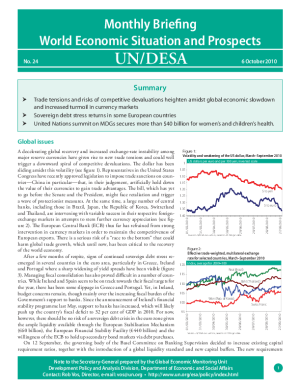October 2010
Summary:
- Trade tensions and risks of competitive devaluations heighten amidst global economic slowdown and increased turmoil in currency markets
- Sovereign debt stress returns in some European countries?
- United Nations summit on MDGs secures more than $40 billion for women?s and children?s health
A decelerating global recovery and increased exchange-rate instability among?major reserve currencies have given rise to new trade tensions and could well?trigger a downward spiral of competitive devaluations. The dollar has been?sliding amidst this volatility. Representatives in the United States?Congress have recently approved legislation to impose trade sanctions on countries?China in particular?that, in their judgement, artificially hold down?the value of their currencies to gain trade advantages. The bill, which has yet?to go before the Senate and the President, might face retaliation and trigger?a wave of protectionist measures. At the same time, a large number of central?banks, including those in Brazil, Japan, the Republic of Korea, Switzerland?and Thailand, are intervening with variable success in their respective foreign-exchange markets in attempts to stem further currency appreciation.?The European Central Bank (ECB) thus far has refrained from strong?intervention in currency markets in order to maintain the competitiveness of?European exports. There is a serious risk of a ?race to the bottom? that could?harm global trade growth, which until now, has been critical to the recovery?of the world economy.
?
Download the World Economic Situation and Prospects Monthly Briefing No. 24
 Welcome to the United Nations
Welcome to the United Nations
